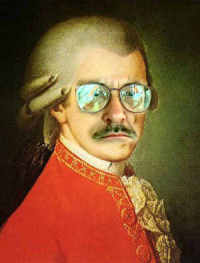A 365-Day Project
"We Are All Mozart"
A project to create
new works and change
the perception of the
music of our time.


 August 31, 2006
August 31, 2006 
The grassroots. It has a nice sound and meaning. Grass propogates through rhysomes, white running roots that poke up through the soil to become green blades in the sun.
In moments of artistic despair, thinking about the grassroots -- pressing and wriggling through the dark place until the warmth of the sun calls on us to rise -- offers strength. The roots are strong, thickly matted, curious, sometimes impenetrable, and forever persistent. Cutting them through with heavy tilling tools makes more rhysome fragments to root and branch out and grow thicker. And the blades of grass are themselves those same roots made manifest to the solar countenance.
I have come to think of new nonpop as a grassroots music. Though it is made and produced by a range of artists that include professionals, its relatively invisibility and small audiences encourage an atmosphere of experimentation and a personal scene. As a composer well past the young & restless stage, I began to resent this apparent underground stasis. A lifetime of pounding the drum for new nonpop, from concerts and festivals to a ten-year cheerleading position behind a radio microphone, hadn't moved it up in the public consciousness. Only the roots were there, no mat of grass to generate pointing fingers and elated oohs. But upward motion is inevitable.
There is precedent for the roots poking through and creating a riot of musical landscape. And there are trends that follow the internet, itself a matted texture of virtual roots. When the "We Are All Mozart" project was conceived, there were few such projects in the arts. In music there was Hermeto Pascoal and Les 365 Jours de Stéphane Trois Carrés and the mixed media of Eve Beglarian's Book of Days. But even more recently there is Suzan-Lori Parks and her 365 Days/365 Plays and even Nick Jainschigg's daily paintings recently profiled in the New York Times. Immediacy is returning to art.
What intrigues about the projects of Parks and Jainschigg is that they use the same premise as "We Are All Mozart" -- that is, to create art that is immediate, wanted and paid for. Each quality has functioned separately in the past. The Fluxus artists were immediate. Personal (or rather, personalized) art is always wanted, by artists if no one else, and it grows from there (witness Steve Reich as the model). In our times, largely comfortable or 'accessible' art is actually paid for.
But more than that is now afoot -- or under foot, under the surface mat of green, wriggling in the dark. An example that is just punching rhysomes into the sun is the Vox Novus 60x60 project. There is an occasional stroke of genius that jolts new nonpop, and Rob Voisey, the man behind 60x60, was stricken with it. The project's idea -- the gimmick -- is to collect sixty-second compositions and package them on a CD that is precisely one hour long. Sixty composers, sixty compositions, sixty minutes. Clever, and only clever, had it stopped there. But Rob's vision (and it's with no small amount of jealousy that I say this about a guy twenty years my junior) was to bring new nonpop in a ready-to-run format to regional, national and international spaces. Regional collections give each concert a different flavor, and some are mated to video work in media presentations designed by Gisela Gamper and Shimpei Takeda. How large the 60x60 collection has grown is unclear perhaps even to Rob, but its contribution to the underground wriggling is inestimable.
VoxNovus got its boost out of New York, but London is coming alive again after a century of new nonpop snoozing. The Heritage Orchestra has the political feel of the venerable Cornelius Cardew Scratch Orchestra without the avant-gardism. The Heritage Orchestra described themselves as "a pioneering cross-genre 40 - 60 member ensemble that ignores classical elitism, and refuses to be a part of the new glossy classical-corporate movement; both of which are diminishing the long-term integrity of orchestral music in the UK" (though that earlier description has been dropped from their present website). In a mutual back-slapping corporatized culture, that is (or was) a strong statement. The group gets out of the concert hall and into the pubs and music halls, throwing themselves into the public milieu in ways reserved for pop genres. Such crossing of genre presentation usually results in quick crash & burn or co-opted success.
The number of dedicated new nonpop ensembles has also grown many and loud. The elder statesmen of Kronos were only the beginning of the pushing up into the popular presentation space, but they carried more formal new music ensembles such as Boston's Composers in Red Sneakers and even the venerable Boston Modern Orchestra Project with them into visibility. Groups including the more poppish Ethel have elbowed into the sunlight, but were artistically quickly overshadowed by upstarts such as Alarm Will Sound and Anti-Social Music. That's good. Artistic competition can be thrilling.
Okay, enough lists. Where am I going with this? I'm merely digging underground again to remark the change in the texture of the soil. A long nonpop winter is just coming to an end, and the grassroots are plumping, their sharp edges pressing up against the ceiling of soil. It feels good and rich, and today's commentary is just a little celebration.
